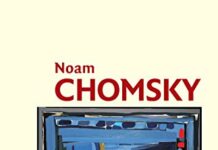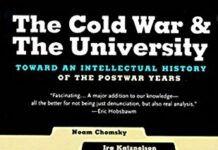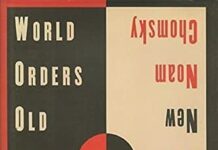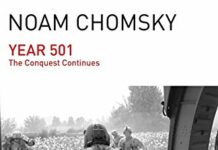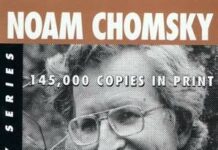
Ebook Info
- Published: 2015
- Number of pages: 464 pages
- Format: PDF
- File Size: 50.38 MB
- Authors: Noam Chomsky
Description
Noam Chomsky addresses relations throughout Central America and relates these to superpower conflicts and the overall impact of the Cold War on international relations.Turning the Tide succinctly and powerfully addresses three interrelated questions: What is the aim and impact of the U.S. Central American policy What factors in U.S. society support and oppose current policy? And how can concerned citizens affect future policy?Turning the Tide shows how U.S. Central American policies implement broader U.S. economic, military, and social aims even while describing their impact on the lives of people in Central America. A particularly revealing focus of Chomsky’s argument is the world of U.S. academia and media, which Chomsky analyzes in detail to explain why the U.S. public is so misinformed about our government’s policies.Whether the U.S. initiates a major invasion in Central America or instead continues to support reaction through the region by economic pressure, CIA intervention, and proxy military activity, many U.S. citizens will want to argue for a more humane policy. Chomsky provides the most compelling available analyses of what is going on, why, and what concerned citizens can do about it.
User’s Reviews
Editorial Reviews: About the Author Noam Chomsky is Institute Professor in the Department of Linguistics and Philosophy at the Massachusetts Institute of Technology, Boston. A member of the American Academy of Science, he has published widely in both linguistics and current affairs. His books include At War with Asia, Towards a New Cold War, Fateful Triangle: The U. S., Israel and the Palestinians, Necessary Illusions, Hegemony or Survival, Deterring Democracy, Failed States: The Abuse of Power and the Assault on Democracy and Manufacturing Consent: The Political Economy of the Mass Media.
Reviews from Amazon users which were colected at the time this book was published on the website:
⭐Not one of Chomsky’s greatest hits, although the one best calibrated to My research of the Iran-Contra affair. It’s true strength is in the first half, where He reviews the ghastliest history of US foreign policy toward Central America. Chomsky somberly brings to light many a US-backed peasant massacre over the ages, of which the court historians had dutifully omitted from reportage. The various quotes and US position papers of the last two centuries depict the bald-faced contempt for the people in that region to govern Themselves, govern land distribution, or govern what is grown from Their own soil. Surprisingly to Me, one of the biggest modern culprits for the destitution and dependency of Central America is the Kennedy administration and its Alliance for Progress program. Where I think His book went wrong is when I found Myself reading page after page about nuclear policy, or the history of US intervention in Southeast Asia, or the domestic politics of Ronald Reagan. I just don’t know why Chomsky would include some of this stuff, especially with the lengthy treatment He gives it. My other beef is with His snarky tone. I know that it’s Chomsky’s trademark to deploy ironic smart missiles to explode the myths of official US history or policy rationale, but the overuse of it causes One to always be on alert for it, instead of just relaxing One’s mind and imbibing something straightforward and literal. Lastly, some of the content has an obvious bias – whitewashing the Sandinistas, blackwashing certain Contra leaders, etc. Chomsky briefly mentions Shirley Christian’s awesome account of the rise and evolution of the Sandinistas (Nicaragua: Revolution in the Family) only to discount it because One of Her sources for accounts of Sandinista violence turned out to be funded by the CIA. Having also just read Christian’s book, I do say that accounts of physical Sandinista violence play a small part within Her book, yet She does not exclude the Contras from reported instances of violence, either. But if You require bloodier accounts of the Contras, Chomsky’s book provides them – few in number as they may be among the contents of His entire book that could’ve been 50 pages lighter.
⭐There’s a reason US citizens don’t know absolutely anything about a region that the US government has so much interest in. This strange dichotomy between the public’s lack of knowledge and the enormous role the US has played in Central America for over a hundred years but most recently in the latter part of the 20th century is explained in great detail by Noam Chomsky. If the American people knew the atrocities that were committed in El Salvador, Guatemala, Nicaragua in the name of democracy and US national security while using Honduras like a dog uses its toys, then people would have been protesting as much or even more than they did during the Vietnam War. You don’t have to be a Latin American expert, or a historian to understand that what happened in the region 40 plus years ago is still affecting those countries today in 2020. This is a must read book if you’re interested in Central America, media manipulation by the White House, and what you can do today to help provide a better understanding of the area.
⭐Zero stars would be my grade. Not worth reading. Chomksky finds no fault with the Khmer Rouge until he starts to lose his audience, but gullibly parrots every salacious piece of anti-American propaganda he can get his hands on from Central America. This “socialist anarchist” is a true Bolshevik, died in the wool, true blue, through and through. –AGF
⭐Great book
⭐This book is is devoted to analyzing Washington’s murderous interventions in Central America during the 1980s: intervention aimed at protecting a client tyranny threatened by popular ferment in El Salvador (and, given less focus, Guatemala) as well as, in Nicaragua, intervention aimed at overthrowing a sovereign government through use of a terrorist proxy army motivated by the deemed unacceptability of the government’s commitment to social reform in the interest of the majority of its population.According to Chomsky, there was a ”U.S.-organized massacre” in El Salvador beginning in early 1980, as Carter was waging a ”war on the peasantry.” What he means by this is that the Carter Administration, far from acting fecklessly or inconsistently, in fact pursued standard operating procedure in a situation where a popular uprising threatens the control of a U.S. client government abroad: it acted perfectly wittingly to provide a local force (the military-run government under El Salvador, operating under what the US government knew to be a civilian guise) with aid which crucially enabled that government to carry out a giant massacre.The massacre was perpetrated against the civilian population, especially the peasantry, by the security forces and its ”death squad” auxiliaries, together constituting a system of repression that was originally set up by the Kennedy Administration and with which the US has retained close ties ever since, as he discusses.Given the abject level of dependency, the local force in question does not even deserve to be called a ”client” but should simply be referred to as a mercenary force. In his words: ”the government was wholly illegitimate, a foreign implant supported by military forces that are hardly more than mercenaries of the foreign power that is responsible for the violent attack against the population of El Salvador under the facade it had create.”This is what he means when he refers to ”Carter’s war on the peasantry” and a ”U.S.-organized massacre” in El Salvador – or, elsewhere ”Carter’s Matanza II” (referencing the original ”matanza”, i.e., mass killing of civilians by the oligarch-supporting Salvadoran military in the 1930s). Carter’s Matanza II was later hugely escalated by Reagan, as the book shows. Chomsky’s use of the quoted terms are obviously meant to provoke, but it is hard to argue that they are not descriptively apt.The is due to the fact that Chomsky supports his discussion of Carter’s Matanza II with plenty of evidence. His main source is the book by Ray Bonner, who was New York Times correspondent in El Salvador while these events occurred – i.e., just about as authoritative a source as you could ask for. Bonner’s book does provide ample support for Chomsky’s account of these events, although Bonner is much more polite and understated in his discussion of the facts.Does Chomsky tendentiously inflate US complicity in the atrocities of its Central American clients? In order to answer that question, simply read the book’s Introduction, where Chomsky takes the position that one might hold, conceivably, that US complicity in these atrocities is ”2%”. That is a pretty low number. How would we react if someone were to argue that the Soviet Union only bore 2% responsibility for repression in its East European satellites—repressive acts that, just like Central America, were directly perpetrated by local forces rather than the imperial power itself.He quotes RAND Corporation scholar Brian Jenkins: ”Argentina acted as a proxy for the United States in Central America.” In the cited study, the quote appears in the context of a discussion of how states are sometimes prevented by domestic constraints from participating directly in warfare and for that reason turns to ”proxies”. The only specific example cited by Jenkins of this proxy relationship between the U.S. and Argentina is the contra war against Nicaragua. Of course, when Reagan entered office his administration started participating directly in the contra war. Domestic constraints were thus evidently no problem under his Administration, hence no need to resort to proxies. It would seem to follow, then, that Jenkins could only sensibly have been referring to the Carter period. There seems every reason to surmise that this proxy relationship did indeed exist under the Carter administration, in spite of Carter officials denying involvement or support for the contra effort.Is this book ”pure Marxist propaganda”? Actually, in Chapter 5, section 7, Chomsky endorses the view of Ronald Reagan that the Soviet Union is an ”evil empire”. That seems like a very peculiar form of Marxist propaganda.In the book, Chomsky presents documentary evidence of gruesome atrocities committed by the U.S.-run contra army attacking Nicaragua—including torture, rape, and mutilation. Is he peddling ”salacious nonsense” by presenting these facts? Possibly under the following interpretation: the ridiculously, over-the-top, gory way in which these U.S. atrocities were committed does have an element of salaciousness. It also has an element of nonsensicality (surely it is senseless under any circumstances to reach a level of brutality quite that high). But I don’t think the salaciousness and nonsensicality of these acts can be blamed on Chomsky for daring to refer to them. Rather, proper blame would seem to lie with the party responsible for the acts themselves, i.e., the U.S. government and its apologists in the media and elsewhere.The subtitle of the book is ”U.S. Intervention in Central America and the Struggle for Peace.” The fourth and fifth chapters are devoted to the ”struggle for peace”, adopting a broader perspective. It features an extensive discussion of the arms race and the nature of and driving forces behind the U.S. system of militarism. This relates to the subject of Central America in that there is a very real threat that such local conflicts might escalate to a possibly terminal nuclear war between the great powers. He then presents a clear-eyed analysis of the obstacles faced by and the opportunities available to movements that are ”struggling for peace” and social justice in Central America and domestically as well. Including these parts in the book seems to me like a justified move.While discussing U.S. crimes in Central America, Chomsky goes off on tangents about U.S. crimes in the Philippines, Indochina, etc. This is a typical Chomsky move. When he is ostensibly discussing topic A, he will go off on a long excursion about topic B. The reason for the excursion is to illustrate a point that relates to topic A, but that would not have been noticed if the focus had been limited to topic A.As he states while opening the third chapter: ”It is natural and proper to focus attention on current atrocities, but it can also be misleading, and can hamper a proper understanding of what lies behind them.” He goes on to observe: ”It is important to recognize that little that is happening [at the time of writing, the mid-1980s] is new. The United has been tormenting Central America and the Caribbean for well over a century, generally in alleged defense against ‘outside threats.’ ” He goes on to discuss how the U.S. has been similarly tormenting other regions of influence as well. The point about avoiding too narrow a focus is very well taken.To conclude, the book is valuable, informative, and illuminating (not to mention rage-inducing). Still today it remains very much worth reading.
⭐A must-read for everyone interested in politics, especially of the US and Central America. Chomsky tells so much truth, backed up with so many good arguments and evidences. I wish everyone could read this to understand our world in which we live in much better.
Keywords
Free Download Turning the Tide: U.S. Intervention in Central America and the Struggle for Peace in PDF format
Turning the Tide: U.S. Intervention in Central America and the Struggle for Peace PDF Free Download
Download Turning the Tide: U.S. Intervention in Central America and the Struggle for Peace 2015 PDF Free
Turning the Tide: U.S. Intervention in Central America and the Struggle for Peace 2015 PDF Free Download
Download Turning the Tide: U.S. Intervention in Central America and the Struggle for Peace PDF
Free Download Ebook Turning the Tide: U.S. Intervention in Central America and the Struggle for Peace
